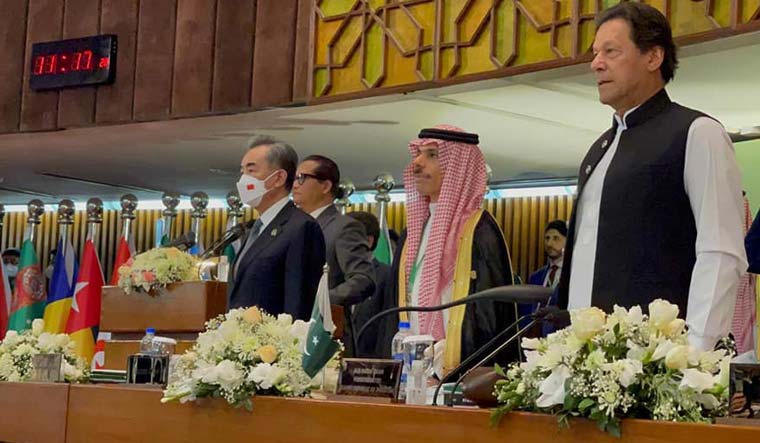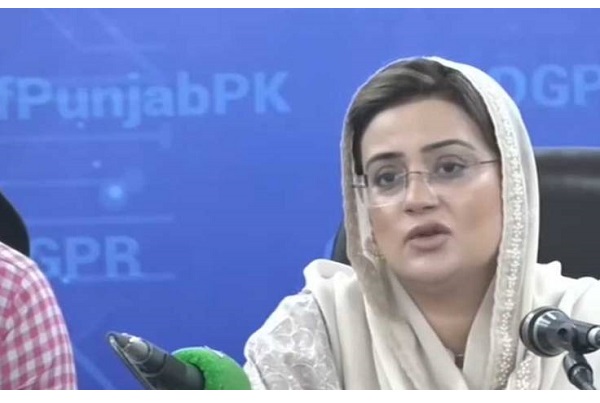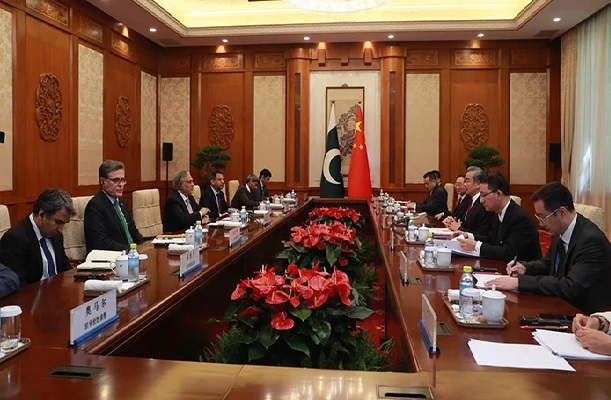ISLAMABAD: The Pakistan Army successfully conducted the test-launch of Fatah-II guided rocket system that has a range of 400 kilometres.
ISLAMABAD; Prime Minister Imran Khan addressed at the inaugural session of the 48th Council of Foreign Ministers (CFM) of Organisation of Islamic Cooperation (OIC) at the Parliament House in Islamabad on Tuesday.
While talking about the OIC's role, he said, "We have failed both the Palestinians and the people of Kashmir. I am sad to say that we have been able to make no impact at all."
The premier said Western countries did "not take the OIC seriously" because "we are a divided house and those powers know it.
"We (Muslims) are 1.5 billion people and yet our voice to stop this blatant injustice is insignificant."
PM Imran said international law was on the side of the people of Palestine and Kashmir, adding that the United Nations Security Council's resolutions backed the right of the Kashmiris to self-determination through a plebiscite. However, the international community never ensured that right was given, he said.
Referring to India's stripping of occupied Kashmir's special status in August 2019, he said "nothing happened because they (India) feels no pressure."
"They feel we can just [pass] a resolution and then [go] back to our usual business."
He cautioned that unless the OIC was united on core issues, human rights abuses would keep happening such as the "daylight robbery in Palestine".
"The only hope I have is that for the first time because of social media, there is awareness in Western countries. Much more than the OIC, it is the mobile phone and the spread of information of the injustices being done to the Palestinians ... at the moment, that is the best way to protect them, not us."
He said India was changing the demography in occupied Kashmir by bringing in settlers from outside but "no one has pushed about it because they think we are ineffective."
The PM began his speech congragulating the Muslim world for the recent adoption of a resolution against Islamophobia by the United Nations General Assembly (UNGA), that proclaims March 15 as International Day to Combat Islamophobia.
He said the world was now realising that Islamophobia was a reality and more needed to be done to combat it.
"Why was Islam equated with terrorism?" Imran questioned, and referred to the Christchurch attack on a mosque as a consequence of this stereotyping.
"Once that happens, how is the man in the street in Western countries, how is he supposed to differentiate between a moderate Muslim and a radical Muslim? Hence, this man walks into a mosque and shoots everyone he could."
The prime minister said it was unfortunate that the Muslim world was not able to combat this image of Muslims. "What should have been done wasn't; the heads of Muslim countries should have taken a stand on this. Unfortunately this narrative of Islamic terrorism, Islamic radicalisation, this narrative went on unchecked."
In response to this wave of Islamophobia, PM Imran said, some Muslim heads of state said they were moderate Muslims. "When you say this, you automatically say there are some extremist Muslims."
There were moderates, liberals, conservatives and fanatics in every human community, he said. But it was only Muslims who were "branded based on their religion", he added.
Muslim states had made the "biggest mistake" by not challenging the narrative because of which Muslims residing in Western countries suffered, he said.
"Any time any terrorist incident by Muslims happened, [it] immediately meant that every Muslim [was] branded. How could the whole community be responsible for some fanatical deed by some extremists?" he asked.
"They were able to vilify our religion and yet there was no coherent response from the Muslim world." Referring to the recently passed UNGA resolution, the premier said he hoped that from now onwards, the Muslim community would be able to put forward its narrative and explain to the West why Islamophobic acts, including "insulting Prophet Muhammad (Peace Be Upon Him) hurts [Muslims] so much."
He also spoke about the state of Madinah, which he said had laid the foundation of "one of the greatest civilisations in human history".
He said he was glad that Chinese Foreign Minister Wang Yi was attending the moot because he wanted people to understand what brought about "one of the greatest revolutions of all time".
"The state of Madinah was ahead of its time and it was the first welfare state in the world. It was a state that took care of its weak, orphans, widows, poor people."
The premier said he was saddened because some European states "look after their animals better than some of us treat our people".
Prophet Muhammad (PBUH) had sparked a "revolution for the quest of knowledge", he said. Comparing the situation to that of today, the prime minister rued, "wherever you go ... we imprison our women, they have no rights. And sometimes, it almost seems the US invaded Afghanistan to liberate the women.
"Sadly, cultural issues are equated with our religion ... Let's not confuse Muslim imperialism with the 10 years of the Prophet in Madinah. Because that's not what the Prophet preached. The whole revolution was about ideas."
The premier also spoke about the global situation, expressing his apprehension that the world is "headed in the wrong way".
A new Cold War had almost started and the world could be divided into blocs, he said, stressing that unless 1.5bn Muslims took a united stand, "we will be nowhere."
No other people had suffered as much as the people of Afghanistan, he said, adding that for the first time in 40 years, there was "no conflict" in the war-torn country. "The only danger now is through the sanctions [imposed on Afghanistan] and non-recognition", which could cause a humanitarian crisis, he cautioned.
He said it was "extremely important" to stabilise Afghanistan because it was the "only way we are going to be able to stop international terrorism from Afghan soil".
"Let's not be delusional that some other country can come in and fight terrorism through drones. The only way is a stable Afghanistan government that can take care of terrorism.
"Anyone who knows the Afghan character should be cautioned, please do not push the people of Afghanistan where they feel their sovereignty is being threatened."
The premier called on the OIC to encourage the Afghan people and include them in the international community, saying he believed the "people of Afghanistan are strong enough to evolve and go in the right direction."
Talking about the ongoing war in Ukraine, PM Imran suggested that the OIC foreign ministers should discuss how the body could "mediate, try to bring about a ceasefire and an end to the conflict".
If the war continued, it would have "great consequences for the world", he cautioned. "All countries that are non-partisan are in a special position to be able to influence this conflict."
He again repeated his suggestion that the foreign ministers discuss the issue, adding that he would also talk about it with Chinese Foreign Minister Wang Yi about how the OIC, along with China, "can influence the events in Ukraine and stop this and have some ceasefire and resolve this conflict".
You May Also Like
LAHORE: The Punjab government of Maryam Nawaz is introducing new defamation law in a bid to ‘stop fake news’. “A person who lies
BEIJING: China is ready to work with Pakistan to develop an “upgraded version” of the China-Pakistan Economic Corridor (CPEC) project






